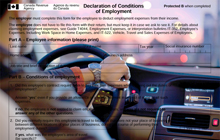Does your job require you to buy luxury goods? And, can you deduct those luxury goods on your taxes?

Canadian tax lawyer and accountant David J Rotfleisch deconstructs the case of Holt Renfre employee claiming luxury clothing expenses in Samotus v. The King
Introduction: Employee Deducts Expenses of Luxury Items for Work
 |
David J Rotfleisch, CPA, JD is the founding tax lawyer of Taxpage.com and Rotfleisch & Samulovitch P.C., a Toronto-based boutique tax law corporate law firm. |
In Samotus v. The King, 2025 TCC 104, the Appellant was employed by Holt Renfrew as a designated sales associate for a specific clothing brand. As part of her role, she was required to maintain a well-groomed and businesslike appearance. She successfully promoted the brand by wearing its clothing, which contributed to achieving $1 million in sales. A benefit of her employment was that she received discounts and allowances to purchase merchandise. Although there was no contractual obligation to do so, the Appellant regularly worked unpaid hours at home to follow up with clients, make phone calls, and complete reports. However, she did not use her home to meet with clients.
In filling out her Canadian T1 income tax returns, she deducted the cost of luxury clothing and home office expenses. The Canada Revenue Agency audited her and requested her to provide Form T2200 "Declaration of Conditions of Employment" from Holt Renfrew for each of the taxation years in question. However, Holt Renfrew refused to issue the forms to the Appellant, stating that it was against company policy and that she was not contractually obligated to incur the expenses in question.
The issue in this case was whether the Appellant was required to incur the business expenses deducted. The specific provisions that were considered by the Court were ss.8(1), (2), (10), and (13) of the Income Tax Act ("Tax Act"). Ultimately, the Tax Court of Canada found that the Appellant was not required to incur the expenses and was not permitted to deduct the expenses.
Section 8 of the Tax Act: Deductions Permitted for Employment Expenses
Section 8(1) permits deductions from a taxpayer's income from office or employment for certain expenses. Deductions that are claimed must be related to the employment or incurred in the course of employment. Subsection 8(1) permits either the whole amount of the expense to be deducted or part of the whole expense that is reasonable. Subsection 8(2) places a general limitation on the deductibility of employment expenses and only allows the deduction of expenses that are listed in section 8.
Subsection 8(10) is related to the certificate of the employer or Form T2200. Form T2200 is a statutory condition for deducting certain employment expenses and is required to be completed by employers in order for employees to be able to deduct employment expenses. The form must also be filed with the taxpayer's income tax return for the year. This subsection only applies to the deductions in paragraphs 8(1)(c), (f), (h) or (h.1) for clergy residence expenses, sales expenses, travel expenses, and motor vehicle expenses, respectively.
Subsection 8(13) permits the deduction of home office expenses if certain criteria are met. In general, an amount is deductible from a taxpayer's employment income for a work space located in his or her home in two circumstances: (1) if the place is where the taxpayer principally performs the duties of the employment or (2) if the place is used on a regular and continuous basis for meeting customers or other persons in the ordinary course of performing the duties of employment.
The Court's Analysis: There Was No Requirement to Incur Employment Expenses
While the Appellant did not direct the Court to a specific provision of the Tax Act that allows the deductions claimed, the Court considered ss.8(1)(f) and (i)(iii). Both of these sections require a T2200 form for a taxpayer to be able to deduct the expenses from his or her employment income. Under both provisions, amounts paid by the employee for the expenses must be required to be paid by the employee under an employment contract. This requirement may be an implied or explicit condition of employment.
Examination of the Employment Agreement: No Express Condition To Purchase Luxury Items
The Appellant's position in regard to the deductibility of luxury clothing expenses was premised on the notion that, to her understanding, the role in which she was employed obligated her to wear the vendor's brands to achieve sales targets. A document related to her employment provided expectations for her to meet sales targets, demonstrate entrepreneurial initiative and leadership, and use her employee perks (i.e., employee discount and merchandise allowance) to wear and promote the products that she represented.
In her opinion, this expectation obligated her to purchase additional clothing at her own expense because the merchandise allowance was inadequate. Further, she stated that she only wore those clothes for work. However, the referenced document did not expressly require her to use her own funds to purchase luxury clothing items as a condition of working at Holt Renfrew.
The relevant question to be asked when making this determination is whether the employer and employee intended that the allowance be the extent of employment expenses that would be incurred. In this case, there was no evidence to support the contention that the Appellant's employer intended her to incur expenses greater than the allowance.
Tacit Understanding Between Employer and Employee: Implicit Terms of Employment
If there is no express condition to incur expenses beyond an allowance, there may still be implied conditions of employment that would require the employee to incur expenses. The Court referred to Tulman v The Queen, 2014 TCC 140, where a tacit understanding between the employer and employee for a condition of employment was sufficient to create an implicit term of employment. To find that there was a tacit understanding, the facts must be objectively examined. Factors such as the need for the employee to incur expenses and the requirement to incur expenses to fulfill the roles of the employee are considered.
In this case, Holt Renfrew explicitly denied that there was any implied condition for the Appellant to purchase clothing for work using her own money. An implicit or tacit understanding cannot be inferred from the Appellant's interpretation of a policy or agreement.
Moreover, the Court stated that the difference between something that is "permitted" and "required" was described in Tulman. The Court found that the Appellant chose, with her own free will, to purchase luxury goods outside of her allowance to be able to excel at her job and was never required to do so.
Thus, there was no implicit or express condition of employment that required the Appellant to purchase the luxury clothing items. She was therefore not permitted to claim deductions on her employment income from those expenses.
Home Expenses: Section 8(13) Deductions Denied
The deductions that the Appellant claimed in relation to her home workspace were also denied. The Court examined the evidence and could neither find that the Appellant principally performed her work at home nor that she met customers regularly at home. Similarly, no evidence could be adduced by the Appellant to show that the expenses were actually incurred.
David J Rotfleisch, CPA, JD is the founding tax lawyer of Taxpage.com and Rotfleisch & Samulovitch P.C., a Toronto-based boutique tax law corporate law firm and is a Certified Specialist in Taxation Law who has completed the CICA in-depth tax planning course. He appears regularly in print, radio and TV and blogs extensively.
With over 30 years of experience as both a lawyer and chartered professional accountant, he has helped start-up businesses, cryptocurrency traders, resident and non-resident business owners and corporations with their tax planning, with will and estate planning, voluntary disclosures and tax dispute resolution including tax audit representation and tax litigation. Visit www.Taxpage.com and email David at david@taxpage.com.
Read the original article in full on Taxpage. Author photo courtesy Rotfleisch & Samulovitch P.C. Title image: StockSnap from Pixabay.





(0) Comments